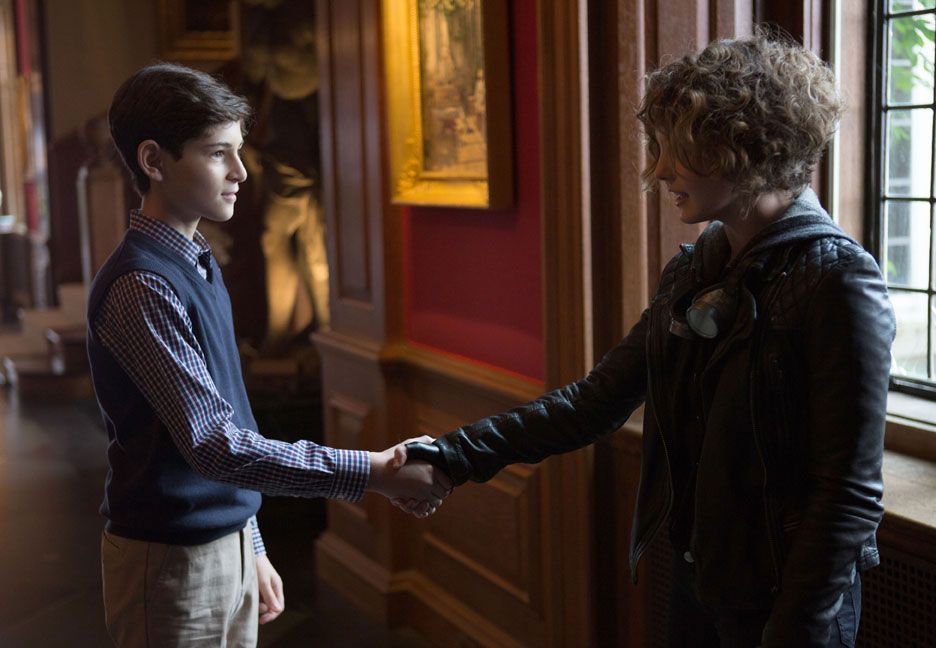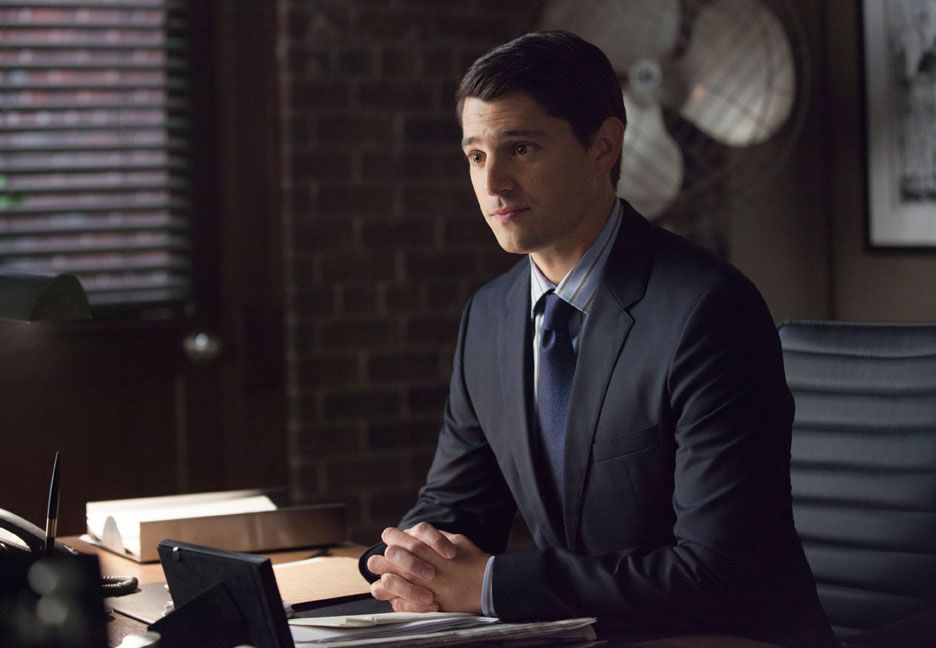Famously -- or should it be "infamously"? -- Harvey Dent is a character known for having two faces. But, as the pre-acid assistant district attorney made his debut on Fox's Gotham last night, maybe the better question would be how many faces the show itself has.
Looking at only the scenes that introduced the eponymous A.D.A., the episode may seem a bit sharper than previous outings for the series. Credit that to Nicholas D'Agosto's generally affable performance more so than Ken Woodruff's script. While there are no groaning "He's a two-faced one, that Dent!" lines to be found as he spelled out the meaning of justice to a teen in need of scaring straight (although this might be the only instance where Gotham's overt referencing would work), most of the philosophy Dent presents across the hour is unmemorable. He wants to be one of the good forces in Gotham alongside Montoya, Allen and now Gordon. He's willing to do whatever it takes to nail corrupt types. He's got a hard-on for nailing one particular crook called Lovecraft. And on and on.
Still, in D'Agosto's hands the character is breezy and likable; it's what the part needs. For Gordon to trust Harvey, he has to genuinely like him -- and a character the audience likes couldn't hurt the show at this point either. This Harvey Dent provides that politician's smile along with the requisite two-headed coin tricks so well, it's easy to ignore how silly his "flush rumors around the Wayne murders down the pipe and hope my guy bubbles up" scheme is.
Gordon goes along with the move, however. He's got enough on his plate as it is. On the one hand, there's young Selina Kyle: For the first time in the show's run, the detective treats the street waif like an actual witness to a crime and has her describe the Wayne shooter to a sketch artist. But beyond that bare-bones bit of police work, Gordon has little to do with her and so ships her off to Wayne Manor for an interminable series of flirtations with young Bruce.
That the scenes between Selina and Bruce should fall so flat comes as little surprise. Even the very best TV dramas have troubles presenting kids as kids, and a show that lacks in subtlety as much as Gotham does never had a chance to turn preteen actors into real characters. Still, the way that Selina responds to every prompt from Bruce with the kind of "I'm saying nothing's wrong with my family background but it's really very wrong" line would make The Walking Dead ashamed. Bruce fares about as well in trying to express embarrassment at how his puberty is showing whenever she's around. One of the worst "faces," the show has built over its opening episodes is what exactly Bruce is supposed to be. Gotham never gave him a "solemn vow at my parents’ graves" scene, and while it doesn't necessarily need that, it should give us a hint of where the future Batman is in his mental development. Is his full scheme of vigilantism already in his mind, or is his grasping at straws as blindly as it seems? Tip-toeing around the issue is doing the character no favors, and Alfred's looks of concern hardly bolster the storyline.
Back in the rest of Gordon's life, his underdeveloped girlfriend Barbara has ridden out of town (likely to viewer's cheers). And that this means more time for Gotham's most consistently stumbling thread of police procedural could be worrisome, but for once the case that Jim and Harvey Bullock is working seems to click along with a little bit of tension and even excitement. On the trail of escaped bomb-maker Ian Hargrove, the detectives actually act the part by chasing down relevant leads in his family and discovering facts that truly complicate the story. Hargrove isn't as wicked as his reputation suggests but rather more mentally unstable and at the mercy of Gotham's rampant corruption. With help, he might break out of the criminal lifestyle, but help in this city is in short supply.
However, just when you thought the show might be finding some new ground to mine from its central premise, the police plot crashes back into familiar-face territory in the worst way. The bombs Hargrove is forced to build by Russian gangsters are just part of another mob revenge scheme that adds little to the overall narrative. Yes, Fish is still trying to undermine Falcone ... somehow. Yes, Falcone and the corrupt mayor are making money off the expansion of the Arkham property ... somehow. Even a bit of business where fan favorite Penguin cracks the code on Fish's honeypot at Falcone's house feels all setup and no payoff.
So the story wraps itself with the face it began with as Dent finds that his "tease a break in the case" scheme did little to rattle Lovecraft's cage. The A.D.A.'s response to the sneering crook is nothing short of a leaked Mel Gibson rage rant, and in it the first flaw in the new character begins to show. Like all things on the show, it's as blunt as acid to the face.
And so it goes on Gotham. For every new face that energizes the scene or every unexpected bright spot, there are any number of familiar tropes, clichés and increasingly lazy plot turns that drag the enterprise down. Will it be better when the mid-season finale hits? Flip a coin.



